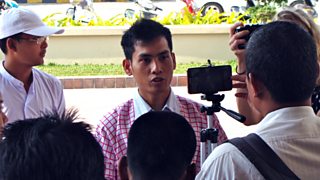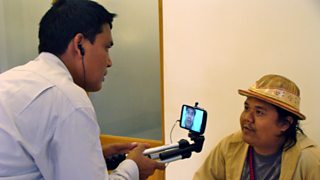Getting our mojo back with MOELJO
Clare Lyons
Senior Trainer

One of the MOELJO trainers, Jack, playing the role of a party candidate whilst being interviewed by trainees
One good thing that came from an unsuccessful grant application last year was the seed of an idea for what became our MOELJO course (mobile phone skills and election reporting for journalists).
It was prompted by three big developments in Myanmar’s (also known as Burma) reform process: the opening up of the telecoms market, which seemed set to improve mobile and internet access across the country (in early 2014, mobile phone ownership was estimated to be around 9%); the promise of free and fair elections in 2015; and the loosening of restrictions on the media. This meant that information could be more widely and easily available to voters around the country during the build-up to the polls.
The MOELJO seed grew in my mind in July after I ran a video skills course. I realised that very few of the trainees could afford to buy either the video cameras or (legal) editing software to practice these skills.
Most of them, however, had smartphones.
Using smartphones
So in September, with the welcome arrival of another trainer, the tech-savvy Jack Aung, the team began to investigate what we could do with android smartphones and apps commonly available in Myanmar. We also researched what election training journalists most needed. The country has limited experience of how elections are run and the rules and circumstances of the 2015 poll will be different from those in 2010 or the 2012 by-election.
The seed grew into a shoot, and by January 2015, it was a healthy sapling. We launched our first course in Mawlamyine, teaching 25 journalists from Mon, Tanintharyi and Kayin states. Since then, with the addition of another great trainer, Phyo Wai Lin, MOELJO has branched out with four more sessions, taking in trainees from Bago, Sagaing and Mandalay regions and Chin and Kachin states.
Election training
On the course, trainees learn how to take better photos, audio and video with their smartphones and share their material. Election training includes discussions with Election Commission officials, senior journalists and CSOs (Civil Society Organisations) and representatives involved in voter education or election monitoring. The final day sees trainees reporting on fictional election scenarios using their smartphones. This involves a cast of up to 15 extras and is like directing live theatre. Exhausting but fun!

One of the MOELJO trainers interviewing an extra - playing the role of a farmer
Some struggle with the technical skills. One trainee told us: "Mobile skills are difficult for older people like me. But now, I know those skills. In addition, I learned how to produce a TV news story with mobile phone”.
Editing on the go
Another trainee showed us a report on a protest which he had filmed and edited alone on his smartphone after our course - and sent it to the newsroom while the demonstration was still going on. To put this into context, with communications and infrastructure in Myanmar still poor in many areas, TV news from the regions can be days old by the time it gets broadcast. Sometimes footage is even sent by bus!
It’s too early to know what impact the training will have on the media’s coverage of the elections, scheduled for November. But the feedback from trainees has been positive and we have had offers of funding to run more such courses.
